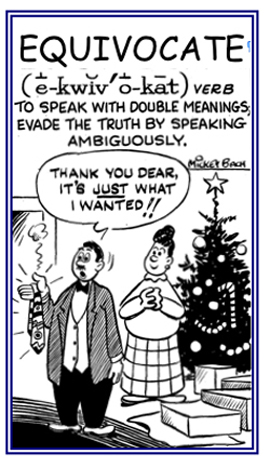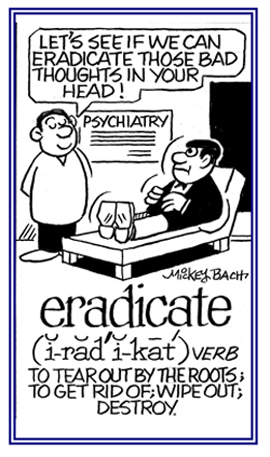-cate
(This suffix has no etymological source; it is just a part of other words.)
diagnosticate
dislocate (verb), dislocates; dislocated; dislocating
1. In medicine, to move a bone out of its normal position or location in a joint: Caroline slipped on the ice and dislocated her shoulder.
2. To force a person, people, or something from one place or situation to another one: The construction of the new hotel in town will dislocate several businesses and residents that are currently in the site where it will be built.
2. To force a person, people, or something from one place or situation to another one: The construction of the new hotel in town will dislocate several businesses and residents that are currently in the site where it will be built.
divaricate (verb), divaricates; divaricated; divaricating
1. To spread apart: Henry was divaricating his fingers after putting on his gloves.
2. To branch off: Gerard's wife was looking at a map and told him to divaricate to the right where the road split into two directions so they would go in the right direction to visit their friends.
2. To branch off: Gerard's wife was looking at a map and told him to divaricate to the right where the road split into two directions so they would go in the right direction to visit their friends.
domesticate (verb), domesticates; domesticated; domesticating
1. In agriculture, to accustom an animal to live with or near people including farm animals or pets: People have domesticated dogs, cats, cattle, horses, chickens, other birds, etc. for many years.
2. To educate people to behave in an appropriate way at home, such as to use good manners, to be polite and helpful: Shirley's mother jokes that the family's cat and dog are easier to domesticate than the children!
2. To educate people to behave in an appropriate way at home, such as to use good manners, to be polite and helpful: Shirley's mother jokes that the family's cat and dog are easier to domesticate than the children!
duplicate (DOO pli cate") (verb), duplicates; duplicated; duplicating
To make an exact copy of something: Andy duplicated copies of pictures of his family to share with his mother.
duplicate (DOO pli kit, DYOO pli kit) (adjective) (not comparable)
Pertaining to something that is exactly the same as something else: For some unknown reason, Louis started to receive two duplicate copies of the same magazine subscription each month.
duplicate (DOO pli kit, DYOO pli kit) (s) (noun), duplicates (pl)
Anything that is is precisely the same as something else: Elizabeth made duplicates of the medical payments before sending copies to the health insurance for refunding.
Steve was duplicating copies of his building contract, keeping one copy for his files and mailing the other copy to the construction company.
duplicate (DOO pli kit, DYOO pli kit) (adjective) (not comparable)
Pertaining to something that is exactly the same as something else: For some unknown reason, Louis started to receive two duplicate copies of the same magazine subscription each month.
duplicate (DOO pli kit, DYOO pli kit) (s) (noun), duplicates (pl)
Anything that is is precisely the same as something else: Elizabeth made duplicates of the medical payments before sending copies to the health insurance for refunding.
In case people lose their house keys, they should have duplicates some where in a safe and easily accessible place.
echolocate (ek" oh LOH kate") (verb), echolocates; echolocated; echolocating
1. To use a sensory system by certain animals; such as, bats and dolphins which usually involve high-pitched sounds that they send out: When creatures are echolocating, they are able to hear and to interpret the echos so they can determine the direction and distance of certain things.
2. In electronics, to determine the location of objects in certain areas by producing audible sounds and analyzing what is reflected back to the sender: Blind people are able to echolocate so they can be aware of, or perceive, where articles are located in order to avoid walking into them or so they can find them.
2. In electronics, to determine the location of objects in certain areas by producing audible sounds and analyzing what is reflected back to the sender: Blind people are able to echolocate so they can be aware of, or perceive, where articles are located in order to avoid walking into them or so they can find them.
educate (EJ uh kayt", EJ yoo kayt") (verb), educates; educated; educating
1. To give knowledge to or to develop the abilities of someone by teaching: Janet decided to study English and German at the university in order to educate students in these subjects in the high school.
2. To arrange schooling for someone: The Johnson’s wanted to have their son educated in a private school, because they thought it would be better than in a public school.
3. To train, to instruct, or to improve somebody's awareness about a particular field of study: There were certain weeks set aside in school for specialists to educate the children about eating properly and staying healthy.
4. Etymology: from Latin educatus, past participle of educare "to lead out"; from ex-, "out" + ducere, "to lead".
2. To arrange schooling for someone: The Johnson’s wanted to have their son educated in a private school, because they thought it would be better than in a public school.
3. To train, to instruct, or to improve somebody's awareness about a particular field of study: There were certain weeks set aside in school for specialists to educate the children about eating properly and staying healthy.
4. Etymology: from Latin educatus, past participle of educare "to lead out"; from ex-, "out" + ducere, "to lead".
embrocate (EM bruh kayt") (verb), embrocates; embrocated; embrocating
1. To rub lotion or liniment on part of the body: Charles went to a physical therapist to ease the itching of his skin by getting it embrocated with a special solution.
2. Etymology: from Latin embrocare, "to treat with healing liquid"; from Greek embrokhe, "lotion".
2. Etymology: from Latin embrocare, "to treat with healing liquid"; from Greek embrokhe, "lotion".
equivocate (verb), equivocates; equivocated; equivocating
1. To be deliberately ambiguous, or unclear, in order to mislead or to withhold information: The applicant for the job seemed to be equivocating when he was asked why he was leaving his current job and wanting to work with this other company.
2. To speak vaguely; especially, in order to avoid a commitment or to fool other people: The judge warned the witness at the beginning of her testimony not to equivocate when the attorney asked her for details about the crime that she saw taking place at the bank.

© ALL rights are reserved.
Go to this Word A Day Revisited Index
2. To speak vaguely; especially, in order to avoid a commitment or to fool other people: The judge warned the witness at the beginning of her testimony not to equivocate when the attorney asked her for details about the crime that she saw taking place at the bank.

Go to this Word A Day Revisited Index
so you can see more of Mickey Bach's cartoons.
eradicate (i RAD i kayt") (verb), eradicates; eradicated; eradicating
1. To destroy or to get rid of something completely, so it can never return or be in existence anymore: Joseph's desire is to eradicate terrorist groups so people can exist in their own countries instead of having to flee as refugees to find safe places to live.
2. To pull out by the roots: Josephine is trying to eradicate the weeds among her flowers before summer arrives.

© ALL rights are reserved.
Go to this Word A Day Revisited Index
2. To pull out by the roots: Josephine is trying to eradicate the weeds among her flowers before summer arrives.

Go to this Word A Day Revisited Index
so you can see more of Mickey Bach's cartoons.
eutrophicate (verb), eutrophicates; eutrophicated; eutrophicating
The process of increasing the amount of elements; especially, nitrogen and phosphorous, in a marine or aquatic ecosystem and the pollution from such sources as sewage effluent or leachate from fertilized fields causes a lake, or pond to become over-rich in organic and mineral nutrients, so that algae and cyanobacteria grow rapidly and deplete the oxygen supply:
"When water regions eutrophicate, they change in many ways: oxygen disappears from the deep places in water regions first."
"When nutrients from the bottom are set free into the water, eutrophicating speeds up and because the content of nutrients is rising, the alqae begins to bloom."
"Since eutrophicating in water regions in their natural state are decreasing, then biological multiplicity decreases, water regions are getting polluted, and the quality of the environment is getting worse."
exauspicate (verb), exauspicates; exauspicates; exauspicating
To do a thing in an unfortunate way; to have ill luck: When taking the final test in German, Greg exauspicated in completing it because he couldn't concentrate that day, and got a poor grade!
excommunicate (eks" kuh MYOO ni kayt") (verb), excommunicates; excommunicated; excommunicating
To remove the membership of an individual from a secular organization or a religious organization through a formal decree or ecclesiastical order: It saddened the bishop of the church to be excommunicating one of the long time members of the church; however, he had no choice because of the violations of the sacred and moral precepts or rules of the church by the member.
explicate (EK stri kayt") (verb), explicates; explicated; explicating
1. To explain something; especially, a literary text, in a detailed and formal way or to make the meaning of a piece of writing, a plan, etc. clear for others to understand: Mildred explicated her suggestions in simple terms to make it more comprehensible for her supervisor to know what she was planning to do for the completion of the project.
2. To develop an idea or theory and to interpret and to show its implications: The teacher was explicating a plain and comprehensible lesson so her students would have better results for the solutions of the math homework.
3. Etymology: from Latin explicare, "to unfold, to unravel".
2. To develop an idea or theory and to interpret and to show its implications: The teacher was explicating a plain and comprehensible lesson so her students would have better results for the solutions of the math homework.
3. Etymology: from Latin explicare, "to unfold, to unravel".
exsiccate, exsiccates, exsiccated, exsiccating (verb forms)
1. To dry up, to deprive of moisture, or cause to dry up.
2. To lose or to cause something to lose moisture; such as, agricultural areas that are being deprived of sufficient water or rainfall.
2. To lose or to cause something to lose moisture; such as, agricultural areas that are being deprived of sufficient water or rainfall.


